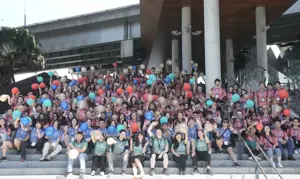A conference for change, a platform for progress

When the Asia & Oceania Federation of Obstetrics & Gynaecology (AOFOG) 2026 conference takes place in Sydney from 12 to 15 October 2026, Associate Professor Jared Watts and Professor Boon Lim are aiming for more than an exchange of ideas and information — they want the event to spark real, lasting change.
This meeting is more than a convening of experts for the obstetrics and gynaecology (O&G) community. It’s a chance to shift how care is delivered, who gets access, and what kind of futures are possible for women and families across Asia and the Pacific.
“This is the first time we’re convening an AOFOG Congress in Sydney,” says Associate Professor Watts, Chair of the AOFOG 2026 Organising Committee and Vice President Elect at the Royal Australian and New Zealand College of Obstetricians and Gynaecologists (RANZCOG). “The event has been designed to connect a diverse mix of voices, experiences and priorities – from young clinicians to experienced healthcare professionals.
“The goal is lasting impact. Not just in the moment, but back home, where care happens every day.”
AOFOG 2026 aims to deliver measurable outcomes across the region. BESydney’s approach to social impact is to help its global clients activate long-term change through seven impact domains where they can deliver the greatest benefit: talent attraction and upskilling; research, development and innovation; Women in initiatives; First Nations engagement; partnerships with lower- and middle-income countries; policy change; and diversity, equity and inclusion.
The AOFOG 2026 program will tap into these impact domains, turning shared conversations into shared progress. BESydney encourages partnerships that extend the value of the event well beyond Sydney – into clinics, communities and policy conversations.

From ideas to action
Lim is clear: the real measure of success isn’t in delegate numbers or social media impressions.
“Success is when someone takes what they’ve learned – a skill, a conversation, a new way of thinking – and applies it in their practice or within their community,” he says.
“What I’m hoping happens through the program is that people pick up things they haven’t learned or been aware of before and go back and apply that in their settings or share that with their peer groups and community.”
Workshops, peer-to-peer learning and storytelling spaces will feature in the AOFOG 2026 program. The organising team, made up of clinicians, midwives, consumers, and community advocates, is curating an experience that is both rigorous and relational.
“We want people to leave inspired, yes. But also equipped,” Lim says. “With ideas they can test, tools they can use and networks they can call on.”
Building a better future together
While the conference will draw over 2,000 attendees to the International Convention Centre Sydney (ICC), Watts and Lim know its value must extend far beyond those walls.
“What we’re hoping our delegates get out of it is applicable and transferable knowledge and skills that they can take back and apply in their clinical settings to improve health outcomes for women and their families,” they share.
Program themes will include key topics across obstetrics and gynaecology, both from a clinical perspective and a broader view of delivery of care in diverse settings and communities.
AOFOG 2026 will draw a strong local cohort and a significant international delegation. For RANZCOG, this creates a powerful opportunity for collaboration with peers from countries including India, Sri Lanka, Indonesia and Malaysia – many of whom already partner with the College through Memoranda of Understanding (MOUs) and shared training initiatives.
Young leaders, new perspectives
One initiative Watts is particularly proud of is the Community Fellowship Program. This program sponsors around 30 young gynaecologists from low-resource settings to travel to Sydney, connect with peers, and participate in the Congress.
“These are future leaders. People who wouldn’t usually have the opportunity to attend an event like this,” he says. “Bringing them here isn’t just about equity. It’s about enriching the whole conversation.”
A platform for equity
Equity is embedded in AOFOG 2026’s design. RANZCOG’s strategic plan commits to representation from rural and remote communities, First Nations health leaders and diverse family and clinician perspectives.
“Whether it’s AOFOG or any other event, we ensure that the topics, the offerings, the workshops, and the engagement reflect that diversity and inclusion,” Watts says.
Program streams will address key issues such as rural and remote health, trauma-informed care, adolescent and menopause health, and culturally safe practices and are designed to resonate across the wide-ranging contexts of the Asia-Oceania region.
Small steps, lasting legacy
Lim acknowledges the challenge: how do you ensure the impact lasts?
“It may not be about launching a breakthrough technology,” he reflects. “But if someone changes how they think about patient care? That’s powerful.”
He believes the key lies in organic knowledge-sharing – where conference learnings are taken home, adapted and passed on.
“That’s the platform… to share that knowledge and engage with different groups so people are doing things a bit differently or thinking about things differently in their own settings.”
The moment that matters
Asked what moment they hope to witness in Sydney, Lim is optimistic, “Two thousand people, from across the world, gathered in one room. The energy, the excitement, the sense of shared purpose. That’s when we’ll know we got it right.”
Looking ahead, Lim says, “A successful global event that brought together groups and specialists from many countries, cultures, and backgrounds… that provided a platform for meaningful engagement and learning… and helped people improve how they conduct their work in their own settings.”


